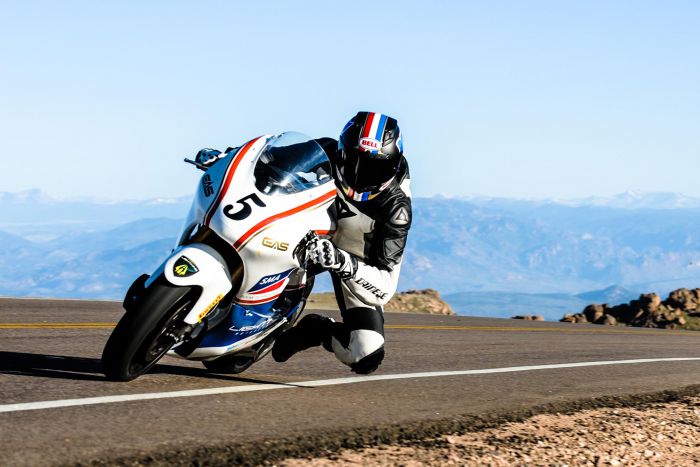Solar-powered motorcyle wins Pikes Peak Hill Climb
 For the first time, a solar-powered electric motorcycle won the Pikes Peak Hill Climb.
For the first time, a solar-powered electric motorcycle won the Pikes Peak Hill Climb.
The legendary race tests the world’s fastest, most elite, innovative and cutting-edge motor technology with a grueling 12.42-mile race around 156 tight curves to the 14,110-foot summit of Pikes Peak in Colorado Springs. It’s the country’ oldest motor race behind the Indianapolis 500 and it’s a true challenge for drivers and vehicle engineers.
Driver Carlin Dunne powered Lightning Motorcycles’ Lightning SuperBike to the top of America’s Mountain in just over 10 minutes (10:00.694). That time beat out all the other competitors in the Exhibition Powersports division, which included several other electric and alternative fuel vehicles. But the time also crunched out all 82 motorcycles that raced the Peak Sunday.
While Dunne was crowned King of The Mountain for the third year in a row and is an accomplished rider, he shares credit for the success with the machine under him.
“We set this as a goal more than four years ago after our first North American road-racing event,” Lightning founder and CEO Richard Hatfield said in a statement. “Sunday, we achieved our goal. This accomplishment is a big step forward for Lightning, and we believe this is a giant leap forward for public acceptance of clean, renewable energy-based transportation.”
Lightning Motorcycles has been researching and manufacturing two-wheeled electric vehicles for six years and is gaining a reputation for excellence. It has been winning races, beating speed records all while setting a standard for sustainability.
“Deciding to go with solar was an easy decision,” according to the California-based company’s website. “It just took some extra effort to execute. We made the extra effort for a couple of reasons.”
Hatfield and his team often hear that electric vehicles aren’t viable or reliable. He has set out to prove those people wrong. Lightning’s racing bikes are virtually the same as the street bikes the manufacturer sells to the public, starting at about $38,000, according the website. Those bikes have a range of 100 miles on the highway. Getting a full charge from a standard residential outlet costs about $1.20, which is equivalent to more than 250 miles per gallon. When the Lightning SuperBike set the World Land Speed Record of 215.960 miles per hour at the Bonneville salt flats its range was 20 miles. And even at its top speed of 218 miles per hour, Lightning claims its bike get the equivalent of 50 miles per gallon.
But powering the bike with solar power at the Pikes Peak Hill Climb allowed the company to win one of the world’s most iconic and challenging races without a carbon footprint.
“The primary goal of the electric superbike is to win races,” Hatfield explains on the company website. “But we are certainly aware of the need to make fundamental changes within the transportation industry. Utilizing solar power is an opportunity for us to demonstrate the viability of clean power generation and to show how the technology can be applied to the transportation industry”
Lightning’s battery technology has been adapted and used in other applications, including electric buses, cars, ATVs and yard trucks for ferrying and shipping containers.



